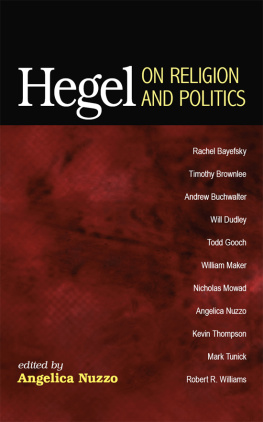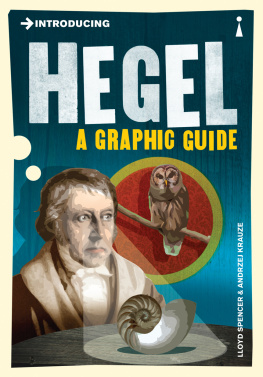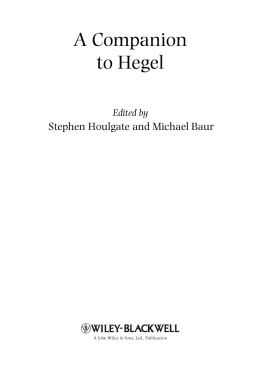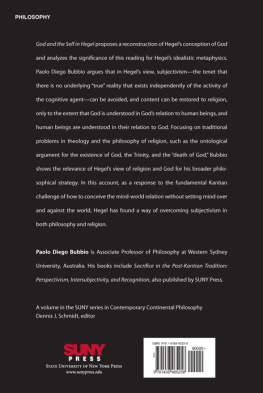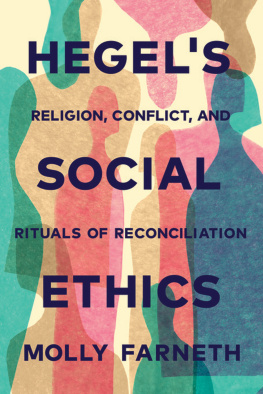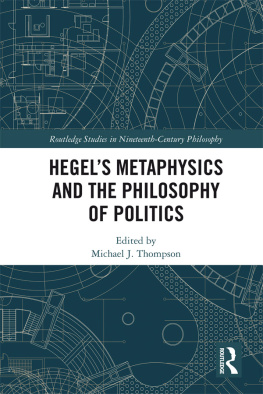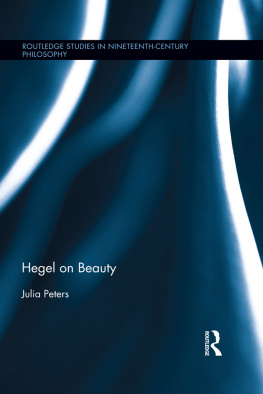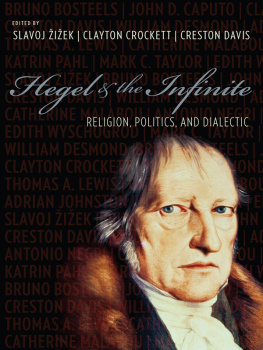Hegel on Religion and Politics
Edited by
Angelica Nuzzo

Published by State University of New York Press, Albany
2013 State University of New York
All rights reserved
Printed in the United States of America
No part of this book may be used or reproduced in any manner whatsoever without written permission. No part of this book may be stored in a retrieval system or transmitted in any form or by any means including electronic, electrostatic, magnetic tape, mechanical, photocopying, recording, or otherwise without the prior permission in writing of the publisher.
For information, contact State University of New York Press, Albany, NY
www.sunypress.edu
Production by Diane Ganeles
Marketing by Fran Keneston
Library of Congress Cataloging-in-Publication Data
Hegel on religion and politics / edited by Angelica Nuzzo.
p. cm.
ISBN 978-1-4384-4565-6 (hardcover : alk. paper)
1. Hegel, Georg Wilhelm Friedrich, 17701831. 2. Religion and state. 3. Burke, Edmund, 17291797. I. Nuzzo, Angelica.
B2948.H3365 2013
322'.1092dc23
2012014291
10 9 8 7 6 5 4 3 2 1
Abbreviations
| AA | Immanuel Kants gesammelte Schriften (Berlin: de Gruyter, 1902). |
| KrV | Kant, Kritik der reinen Vernunft. As is customary, references to KrV will be to the page numbers of the A (1781) and B (1787) editions. |
| KpV | Kant, Kritik der praktischen Vernunft (1788). |
| KU | Kant, Kritik der Urteilskraft (1790). |
| GW | G.W.F. Hegel, Gesammelte Werke. 21 vols. Deutsche Forschungsgemeinschaft. Hegel-Kommission der Rheinisch-Westphlischen Akademie der Wissenschaften und Hegel-Archiv der Ruhr-Universitt Bochum (Hamburg: Meiner, 1968). |
| LPR | G.W.F Hegel, Lectures on the Philosophy of Religion, trans. R. F. Brown, P. C. Hodgson, J. M. Stewart (Berkeley: University of California Press, 1984). |
| PhG | G.W.F. Hegel, Phnomenologie des Geistes, ed. Johannes Hoffmeister (Hamburg: Meiner Verlag, 1952). |
| PhS | G.W.F. Hegel, Phenomenology of Spirit, trans. A. V. Miller (Oxford: Oxford University Press, 1977). |
| TW | Werke in zwanzig Bnde, ed. E. Moldenhauer and H. M. Michel (Frankfurt a.M.: Surhkamp, 1986). |
| Rph | Naturrecht und Staatswissenschaft im Grundrisse: Grundlinien der Philosophie des Rechts (1821). GW 14 / TW 7. Followed by number; R for Remark. |
| Enc. | Encyklopdie der philosophischen Wissenschaften im Grundrisse. Followed by number; R for Remark (Anmerkung); A for Addition (Zusatz). |
Introduction
Angelica Nuzzo
The connection between religion and politics is a hot and controversial topic in today's political and intellectual discussion as it was in Hegel's timethat is, during the first decades of the nineteen century and in the first reception of Hegel's philosophy in the second half of that same century. Indeed, issues pertaining to this topic are daily at the center of inflamed policy and political debates in secular states around the world, and shape the life of millions of people in theocratic regimes. Globalization, population mobility, immigrations and diasporas of various kinds, the very nature of our multicultural societies are among the factors that make the intersection of politics and religion a crucial issue of our time. Today questions regarding religious diversity and toleration of diversity, concerning possible limits of acceptability of various religious practices within secular societies, not only pitch the Western democratic world against theocratic regimes but deeply divide the Western world itself.
Philosophically, the problematic constellation covered by this connection addresses additional general issues such as the relation between the church and the state, or alternatively, the sacred and the secular, the theological and the political, and leads to the discussion of the role and limits of religious life within the modern state and in modern politics. For Hegel, it also concerns more specific problems of modernity such as the conception of freedom and the conditions of its subjective as well as objective realization in the historical world; the autonomous status reclaimed by subjective consciousness and its rights; the limits of values such as toleration; the function of political institutions in fostering, promoting, and regulating those rights and values; and the role that religion, in connection with culture and education, plays in some of the great historical upheavals and transformations of the modern worldfrom the French Revolution to the industrial revolution and the emergence of capitalism. Finally, the problematic issue of understanding the relationshiphistorical and political at the same timebetween the different world religions becomes a central topic of philosophical consideration. While Hegel here follows in the aftermath of the Enlightenment tradition, this is also an issue with which we are confronted almost daily: how can we judge the different world religions without biases and without superimposing doubtful ideologies and axiologies? Is such judgment possible at all, and can it be separated from a certain, more or less implicit philosophy of history?
Moreover, for its touching on this complex constellation, the connection between religion and politics offers an interesting entry point in the discussion of Hegel's practical philosophy as it exposes some of its most controversial theses allowing one to reassess them in a new light: from the claim that the political state, although separated from the church, is in some sense itself a consecrated entity (and that right as such is something sacred), to the preeminence that Hegel assigns to Christianity (and Protestantism) over all other historical religions, up to the role that such preeminence plays in his alleged teleological view of the historical development (guided, in its latest phase, by the German state). Finally, the focus on the relation between politics and religion sets Hegel's practical philosophy in conversation, on the one hand, with modern thinkers such as John Locke, Edmund Burke, and more generally the thinkers of the Enlightenment, and on the other hand, with successive philosophers such as Ludwig Feuerbach, Max Weber, and John Rawls, thereby leading us to evaluate alternatively the usefulness and the limits of Hegel's theory for the understanding of some enduring questions of our own contemporary world.
While Hegel's social and political philosophy has been one of the most studied parts of his system during the last few decades, and his philosophy of religion, in the aftermath of the recent critical edition of the Lectures on the Philosophy of Religion, This volume begins to fill this gap. By bringing Hegel's contribution on the topic to bear on some crucial questions of our time, the essays of this volume show, alternatively, the fruitfulness and the limits of the perspectives and ideas he has to offer us.
A first sense of the variety and richness of themes that can be found at the intersection of politics and religion in Hegel's philosophy can be gained by briefly addressing the systematic connection to which these topics belong in the overall development of Hegel's mature thought. To be sure, Hegel's reflection on these issues dates back to his early philosophical works in the Frankfurt and Jena years leading up to the 1807 Phenomenology of Spirit. However, it is in the Encyclopedia (in its three successive editions of 1817, 1827, and 1830) and in the 1821 Philosophy of Right
Next page
